UNC Charlotte Botanical Gardens Cultivate Creative Class Setting
Tree-lined trails spider through the glen. An emerald canopy blocks the cloudy sky from view. As visitors walk through the fresh blooms of the pink and white azaleas, a subtle fragrance lingers. Birds sing to one another as water murmurs in moss-lined rocky streams, and a warm breeze rustles the leaves. The hushed whispers of UNC Charlotte students add another note to the song in the UNC Charlotte Botanical Gardens.
On this day, the students are scholars in Allison Hutchcraft’s Intermediate Poetry class. Hutchcraft, an English lecturer and lover of the Botanical Gardens, has taken her class outside to embrace nature and to gain inspiration from the natural world.
“In my Intermediate Poetry class last spring,” she says, “we read two collections of poetry that looked to gardening and the natural world – Catalog of Unabashed Gratitude by Ross Gay and Lucky Fish by Aimee Nezhukumatathil – and then visited the Gardens to explore how we, too, can integrate the natural world into our creative work.”
Students adore this, as judged by their expressions and discussions. They sit on abandoned benches, tree trunks and bridges and soak in the natural atmosphere around them.
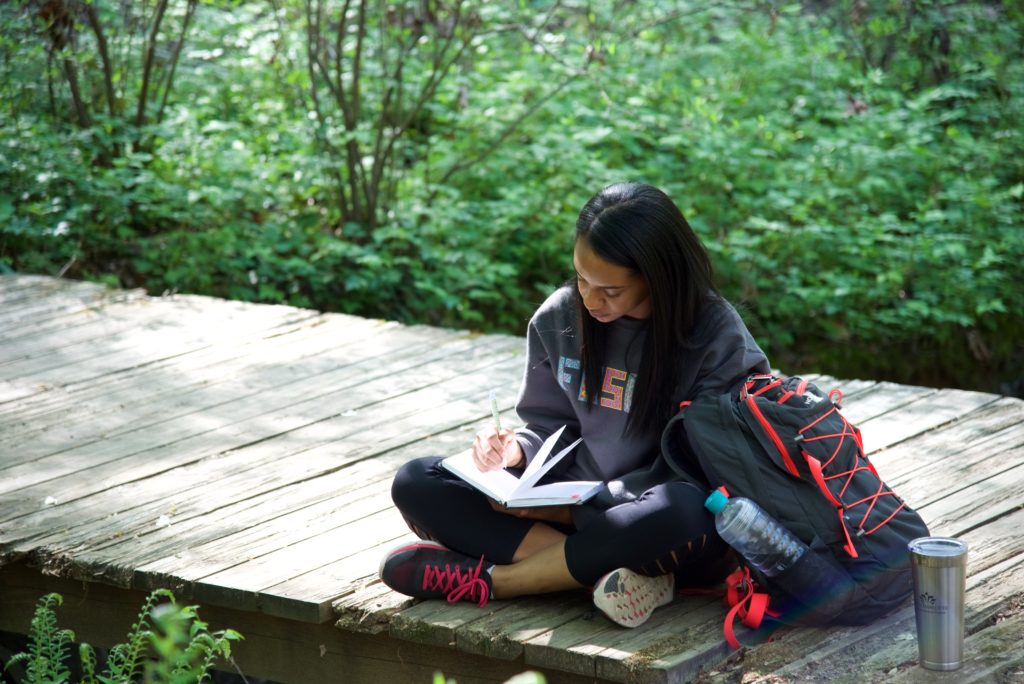 Hutchcraft is among the faculty who turn to the alluring Botanical Gardens. Dave Brodeur, who teaches graphic design in the College of Arts + Architecture; Jamie Strickland of Geography & Earth Sciences; Aaron Kampe of Biological Sciences; Susanne Gomoluch of Languages and Culture Studies; and others are sharing time in the Botanical Gardens with their students, studying subjects ranging from graphic design to ecological interactions.
Hutchcraft is among the faculty who turn to the alluring Botanical Gardens. Dave Brodeur, who teaches graphic design in the College of Arts + Architecture; Jamie Strickland of Geography & Earth Sciences; Aaron Kampe of Biological Sciences; Susanne Gomoluch of Languages and Culture Studies; and others are sharing time in the Botanical Gardens with their students, studying subjects ranging from graphic design to ecological interactions.
Assistant professor of English Matthew Rowney incorporates the Botanical Gardens bounty into his teaching by comparing the setting to those found in Wordsworth’s The Prelude. With his class, he takes a historical approach by contrasting the landscapes of 18th century China and Britain with these modern gardens. He uses the Botanical Gardens as an example of the differences, considering the versions of nature and landscape aesthetics found in the UNC Charlotte setting and drawn from the pages of the famous literary work.
“I am hoping to complicate the simple idea of enjoying nature by thinking about these historical developments that have shaped what the natural world actually is,” Rowney says. “I think we should try to be critical about what it means to look at nature. How can that be problematic, especially when that nature has been set up to look a certain way and it’s not something just simply found? What are some of the complications that arise when thinking about what it means to have an experience with the natural world?”
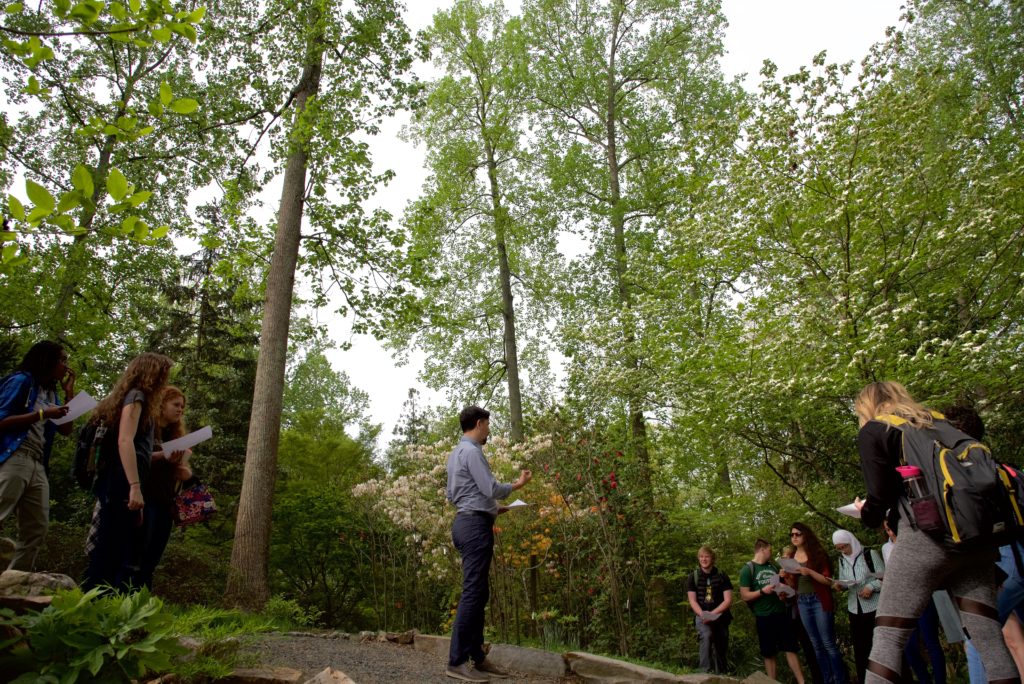 These questions perhaps have his students thinking more deeply and with more complexity than they would in a traditional classroom setting, as if the open natural space creates openness in their minds.
These questions perhaps have his students thinking more deeply and with more complexity than they would in a traditional classroom setting, as if the open natural space creates openness in their minds.
“The Gardens help bring to life some of the aspects that the poem is dealing with and the class is dealing with more broadly,” Rowney says of this semester’s work. “I think that often we get so used to dealing with texts in the same way, that we forget that we’re actually talking about the real world out there. Going to the Gardens gives us opportunity to provide another way of thinking about the subject matter and to give a broader perspective on some of the issues involved in the course.”
Words: Heather Benson, Student Communications Assistant | Images: Lynn Roberson, College Communications Director | Pictured (from top) Matthew Rowney (r) with class; student in Allison Hutchcraft’s class reflects through her writing; Rowney’s class discusses Wordsworth’s The Prelude.
Exceptional Faculty Receive College 2017 Teaching Excellence Awards
In recognition of their exceptional teaching, Ashley Bryan, Nishi Bryska and Ian Marriott have received the College of Liberal Arts & Sciences’ Excellence in Teaching Awards for 2017.
Bryan, a faculty member in the Department of Religious Studies, has received the Outstanding Teaching by a Part-Time Faculty Member Award. Bryska, a faculty member in the Department of Biological Sciences, has received the Outstanding Teaching by a Full-Time Lecturer Award. Marriott, a faculty member in the Department of Biological Sciences, has received the Integration of Undergraduate Teaching and Research Award.
They, along with finalists for the teaching awards, were honored at a college reception on April 24. Dean Nancy A. Gutierrez and the awards committee chairs commended the honorees for their innovation, creativity and focus on engaging students in scholarship and research.
The finalists for the Outstanding Teaching by a Part-Time Faculty Member Award were Valerie Bright of English and Jeanne-Marie Linker of Mathematics & Statistics.
The finalists for the Outstanding Teaching by a Full-Time Lecturer Award were Hannah Peach of Psychological Sciences and Wafaa Shaban of Mathematics & Statistics.
The finalists for the Integration of Undergraduate Teaching and Research Award were Jennifer Munroe of English and Stephanie Norander of Communication Studies.
The Winners Are:
Ashley Bryan
Ashley Bryan is a part-time faculty member in the Department of Religious Studies. After graduating from Temple University with a bachelor’s degree with a concentration in religion and philosophy in a global context, she worked at a small business in Charlotte in the technology sector. She credits her liberal arts degree and her knowledge of international cultures as the reasons for gaining this employment. Later, Bryan entered the master’s degree program in religious studies at UNC Charlotte, where she was a graduate teaching assistant. She joined the faculty at UNC Charlotte in 2013.
“All of my classes are designed so that students can truly be self-directed learners within the parameters set forth in the class,” Bryan says. “Even though I give students very instructive advice related to proven methods that can help structure their own success, I recognize that each student is an individual with their own study methods, external obligations, internal struggles, and personal preferences.”
Bryan has developed innovative courses in Religious Studies, and students return to study with her repeatedly. Her teaching evaluations from students demonstrate that she is a faculty member who is thoughtful, challenging, and interested in the intellectual well-being of students at the university.
“Though many former students liken me to a mentor, I firmly maintain that I am only a supporting actor; it is the curiosity and imagination contained within the students themselves and the liberal arts ethos of ongoing self-driven education that enables students to effect change in their lives and the world around them,” she says.
Nishi Bryska
As a senior lecturer in the Department of Biological Sciences, Nishi Bryska has contributed to the human anatomy and physiology lecture and laboratory instruction offered by both Biological Sciences and, at one period of time, Kinesiology. She has also helped develop the curriculum for the Animal Physiology Laboratory and two new liberal studies courses. She advises biology majors and students seeking professional degrees in allied health fields.
Her teaching philosophy is focused on promoting positive learning experiences, sparking an enthusiasm for learning, and providing strong foundations for lifelong learning.
“I think learning should be stimulating and exciting,” Bryska says. “I try to have the students think of a difficult concept as if it is a mystery novel. There is a beginning and an ending. I want them to be excited about arriving at the end.”
Over the years, Bryska has used different methods of teaching, and she finds it exhilarating to actively involve students in learning.
Her course material is presented in a variety of ways that include lectures, demonstrations, in-class problem solving sessions, group work, and even role playing where she has selected students pretend to be amino acid units in order to demonstrate how a protein structure forms or the molecular structure of muscles. A former student states that she is a “really excellent professor who taught professionally and uses a variety of methods to help students understand.”
Her future plans are to incorporate inquiry-based learning in her courses, by which students would practice problem-solving and critical-thinking skills to arrive at the appropriate conclusions.
Ian Marriott
Ian Marriott, professor of biological sciences, is a prolific researcher in immunology and biotechnology, and he has an extensive record of both integrating undergraduate students in his own scholarly research and integrating undergraduates’ research into his classroom and research practices.
He has co-authored eight peer-reviewed articles and numerous conference presentations with undergraduates, including some in which the student was the first author. He routinely designs classroom activities that facilitate student designed-and-conducted research.
In addition to an impressive record of funded research of his own, Marriott is the co-principal investigator on a $70,000 award from the North Carolina Biotechnology Center that funded the purchase of new equipment to support two practical, hands-on, undergraduate courses that focus on the application of current biotechnology and immunological techniques. He developed these courses with colleague Kenneth Bost.
In his research-intensive classes, he integrates material from his federally funded biomedical research program. “Undergraduate students in these courses are encouraged to actively participate in the design, performance, and interpretation of the results, of such experiments,” he says. “It is only in this setting that students can begin to appreciate the complexity of the interaction between our bodies and bacterial and viral pathogens and, importantly, recognize the limits of our current understanding of disease processes.”
Students and alumni say Marriott excels at creating a classroom environment where they feel safe and supported as they assume intellectual risks they find are key to scientific discovery and scholarly innovation.
Award Finalists Are:
Valerie Bright
Valerie Bright is a part-time faculty member in the Department of English. She earned her undergraduate and graduate degrees in English from UNC Charlotte and regularly teaches two of the core liberal studies courses the English Department offers for the General Education Program as well as core courses in the area of children’s literature.
Bright says she believes that learning is an internal process and that students learn more when they are interested and engaged. When she approaches a course, her goal is to help students improve their active listening, develop critical thinking skills, appreciate and champion diversity, gain confidence, and import the idea that learning can be enjoyable.
She not only wants her students to leave the classroom with more information about the subject matter, but she also wants them to have grown as an individual. Students frequently comment on her high energy, her enthusiasm for the course material, and her creativity in the classroom. It is her hope that through connecting with her students and allowing them to explore their own ideas in writing, conversation, and assignments, they will be encouraged to pursue knowledge.
Jeanne-Marie Linker
Jeanne-Marie Linker is a part-time lecturer in the Department of Mathematics and Statistics. She earned her master’s degree in pure mathematics from Texas State University, after receiving her undergraduate degrees in biology and chemistry from UNC Charlotte.
She believes that every student of mathematics is entitled to instruction that is clear, accurate, and thorough. Her goal as an instructor is to instill in her students the joy she finds in mathematics and logical problem solving, with her classroom serving as a place for creativity, discovery, and growth.
“My firm belief that any student, even the most woefully underprepared, can improve their mathematical ability significantly over the course of a semester, is a powerful motivator for me as a teacher of mathematics,” she says. “I am enthusiastic not only about the subject matter, but also about the potential of my classes to have a real impact on student success.”
Hannah Peach
Hannah Peach has taught a variety of courses in the Department of Psychological Sciences, ranging from General Psychology to Research Methods I and II to the Undergraduate Teaching and Research Assistantship courses as well as co-instructor for a couple of doctoral level courses. She has also mentored numerous undergraduate research students.
Peach incorporates examples, demonstrations, and “learn by doing” assignments and activities into her lectures to help students deepen and apply the content knowledge of the course.
Peach says she values a classroom environment that is interactive and encourages critical thinking. Her approach encourages teamwork and exposes students to diverse perspectives, facilitating the building of relationships with peers from a variety of backgrounds.
Wafaa Shaban
Wafaa Shaban is a senior lecturer in the Department of Mathematics and Statistics. Her teaching career began as an elementary school math teacher, and later moved o the middle school, high school, and college levels. She teaches a variety of mathematics and statistics courses in the department and also directs the Actuarial program, a program she established at UNC Charlotte. She advises the Math Club, the Pi Mu Epsilon Math Honors Club, and the Actuarial Science Club.
Shaban shows that she understands that a requirement for being a successful teacher is learning new material and then delivering that material effectively to students. Early in her career, her exposure to Actuarial Science was new. Along with six students, she worked to learn more about the field and to prepare the students for the Actuarial exams. Since then, she has immersed herself in the field and has passed the exams necessary to gain the “Associate” designation within the Society of Actuaries.
“Shaban works tirelessly to help her students get all the academic and career resources they need,” a former student says. “She makes every student feel like they are able to achieve so much more than they believe they can.”
Jennifer Munroe
Jennifer Munroe, associate professor of English, develops pioneering digital humanities tools to study Shakespeare and Early Modern English Literature. Munroe treats her undergraduate students as genuine collaborators.
Through both classroom activities and independent research, undergraduate students have been key contributors to several projects, including her edited volume Ecofeminist Approaches to Early Modernity, and her latest digital humanities project, the Early Modern Recipes Online Collective (EMROC). This project digitizes centuries-old recipes and makes them widely available in a database.
Her students are also conducting original archival work that contributes to scholarly and public knowledge, and they are practicing concrete skills that they can use in graduate school or nonacademic careers.
Stephanie Norander
Stephanie Norander is associate professor of Communication Studies and executive director of the Communication Across the Curriculum program. She excels at incorporating original, applied research activities into her classes.
Her Advanced Topics in Organizational Communication class conducted a focus group study on the UNC Charlotte University Professional Internship Program, for example. Students conducted all aspects of the research, including applying to an external agency to fund the project.
These applied research projects let students directly practice the exact skills and processes that they will use in the field. Norander also mentors students outside the classroom, including independent research projects that have been accepted to professional conferences, and co-authored publication.
Pictured: Ian Marriott, Ashley Bryan, Nishi Bryska, Nancy Gutierrez
Junior Erica Cherian Receives Newman Civic Fellowship
Erica Cherian, a junior at UNC Charlotte who is devoted to addressing issues of healthcare access and utilization by Charlotte’s most vulnerable citizens, has been named a Newman Civic Fellow.
“For as long as I can remember, I have been driven to defend those who could not defend themselves,” says Cherian, a biology and Spanish double major who also is a Levine Scholar. “Frustration gnaws at me when I see injustice being done, or human beings reduced to stereotypes and therefore being treated differently.”
Newman Civic Fellows are student leaders who have demonstrated an investment in finding solutions to challenges that face their communities. They were nominated by their college/university presidents. Through the fellowship, Campus Compact provides learning opportunities focused on the skills fellows need to serve as effective agents of change in addressing public problems and building equitable communities.
As an aspiring physician, Cherian has focused her scholarship, research and volunteerism on the disparities in healthcare. She has volunteered with free clinics in the Charlotte region, particularly those working with the Hispanic population.
“I think it’s important that we think about the service we’re doing,” Cherian says. “One of the hot terms right now is voluntourism. But there is so much need in this country. There are so many things people could be doing here. You don’t necessarily have to go abroad to get that experience. There are people suffering here. That’s an important story that needs to be told.”
North Carolina and the Charlotte region have one of the fastest growing undocumented Hispanic populations in the nation. “They don’t have a lot of resources, and they are people who have needs,” she says. “I think it’s important we address those needs. One of the biggest needs is health care because they don’t necessarily have insurance, and they don’t always have access to health care or knowledge of how to access health care.”
Her studies at UNC Charlotte have exposed her to data about health care disparities. She has taken that knowledge and expanded it through her immersive experiences.
“Learning about numbers and statistics is nothing compared to the experience of speaking with real people about the trials and hardships that they have faced in accessing care,” she says. “In collaboration with my peers, I am working to develop an app that will disseminate healthcare information and resources to Hispanic teenagers. While this only addresses a symptom of the larger problem of inequity that resounds throughout the system of healthcare, it does help address the immediate crisis of access.”
Cherian volunteers at one clinic as an interpreter, assisting with patient flow and processing and encouraging other UNC Charlotte students to consider their engagement opportunities.
“Her leadership by example inspires other students to develop the language skills and grounded experience to look beyond abstract numbers and descriptions of healthcare needs, and develop the vision and understanding to serve the needs of the most vulnerable patients,” says UNC Charlotte Chancellor Philip Dubois.
While public recognition for her service makes Cherian a bit uncomfortable, she also embraces the need to acknowledge that service is important.
“With the polarization that is occurring now, I think the most important thing that service does for you is that it really brings out your empathetic side and helps you see what people are actually experiencing, not the misleading stories that are being told about people,” she says. “Those stories are not reality. The statistics, too, are not the same as actually talking with people and interacting with them.”
Campus Compact, a Boston-based non-profit organization working to advance the public purposes of higher education, named 273 students as its 2017 cohort of Newman Civic Fellows for the one-year fellowship. The Newman Civic Fellowship is supported by the KPMG Foundation and Newman’s Own Foundation.
Outstanding CLAS Undergraduates Earn Goldwater Scholarships
Undergraduate students Mary (Tess) Overton and Nemah-Allah Saleh have received Goldwater Scholarships, as only the second and third students at the University ever to receive this award. The scholarship is the premier undergraduate award of its type in the fields of mathematics, the natural sciences and engineering.
Saleh, a Biology Honors student, is pursuing a bachelor’s degree in biology and is a biotechnology minor and chemistry minor. Overton, a Crown Scholar and University Honors Program student, is pursuing bachelor’s degrees in biology and chemistry.
“Tess and Nemah are ideal choices for these very prestigious national scholarships,” said Nancy Gutierrez, dean of the College of Liberal Arts & Sciences. “Both are excellent scholars who have embraced interdisciplinary research. Through their work with an array of mentors, they are already contributing in a meaningful way to the intellectual life of our college, the University and the broader community.”
Saleh intends to pursue her Ph.D. in biochemistry or molecular biology. “After obtaining my Ph.D., I intend to conduct research in a university laboratory while teaching or in a government laboratory, such as at the NIH (National Institutes of Health), on the central compound necessary for life: the protein,” Saleh wrote in her scholarship materials.
Her rigorous coursework at UNC Charlotte has prepared her for research settings, building skills such as patience, resiliency and versatility, she said. “Research projects in X-ray crystallography, electrical conduction of single crystals and electron transfer in nanostructures have all helped my development as a confident, self-assured laboratory scientist,” she said.
Overton plans to pursue a Ph.D. in molecular biology to prepare her for a career in government research. She first began research the summer after her high school junior year at the North Carolina School of Science and Mathematics. She did research in a lab at Duke University, followed by an internship at the National Institute of Environmental Health Sciences.
“Because of my early exposure to research in professional settings, I began working with Dr. Shan Yan my first semester of college,” Overton wrote in her scholarship materials. “The Yan lab at UNC Charlotte studies DNA damage response and repair (DDR), a multipath processes that responds to endogenous or exogenous damage to DNA.” From her early internships to her work in the Yan lab, she has realized that research is her passion, she said.
While both scholars have worked with several mentors, Overton considers Yan her primary mentor, and Saleh names Michael Walter and Daniel Jones as her primary mentors. The students also worked closely with the Honors College Campus Endorsement Committee, chaired by Honors College Executive Director Malin Pereira, and Karen James, associate director for scholars advising, who works closely with all students applying for competitive scholarships.
The 240 Goldwater Scholars were selected based on academic merit from a field of 1,286 natural sciences, mathematics and engineering students from among 2,000 colleges and universities nationwide. Each applicant had to receive their university’s endorsement through an internal competitive process before entering the national competition.
Goldwater Scholars have very impressive academic qualifications that have garnered the attention of prestigious post-graduate fellowship programs. Recent Goldwater Scholars have been awarded 89 Rhodes Scholarships, 127 Marshall Awards, 145 Churchill Scholarships, 96 Hertz Fellowships and numerous other distinguished awards like the National Science Foundation Graduate Research Fellowships.
The scholarships will cover the cost of tuition, fees, books and room and board up to a maximum of $7,500 per year. The Goldwater Foundation is a federally endowed agency established by Public Law 99-661 on Nov. 14, 1986, honoring Sen. Barry Goldwater. Since its first award in 1989, the Foundation has bestowed 7,921 scholarships worth approximately $63 million.
Words and Image: Lynn Roberson | Pictured: Nemah-Allah Saleh (left) and Tess Overton
Swiped Topiary Inspires Botanical Gardens Staff, Engages Community
When a treasured topiary tree was scooped from the soil and stolen from the UNC Charlotte Botanical Gardens the first weekend of April, hundreds of people turned to social media to spread the word. Upon the plant’s return one day after the community learned it was missing, the outpouring continued.
“We are always moved by the connection people feel with the Botanical Gardens and their belief in the importance of our gardens to the community,” Botanical Gardens Director Jeff Gillman said. “We see this every day, but we certainly were a bit in awe of how many people took action. When we posted on Facebook about the theft, 535 people shared the post, many of them with comments about their experiences with the Botanical Gardens.”
The original Facebook post included a photo of the tree and read, “Please help. This weekend, probably Sunday, this topiary was stolen from the UNC Charlotte Botanical Gardens. We have been training this tree for over three years. It was a favorite of the staff, particularly one of our recently retired gardeners who spent hours shaping it. We are a free garden. We know that we will lose flowers here and there, and we know that some people will take advantage of us, but this one hurts. Our guess is that this plant was taken for installation in someone’s yard — It will probably go in this week. We’re not interested in pressing charges, or in punishing anyone, we just want our topiary back. Please share this post and help us get our plant back.”
One day later, when the Botanical Gardens shared the news on Facebook that the plant had reappeared with an abject note of apology, close to 400 people “liked” the post, and almost 225 shared the post, many with comments. TV news crews also documented the incident, helping to spread the word, and the gardens staff received phone calls, emails and comments from visitors.
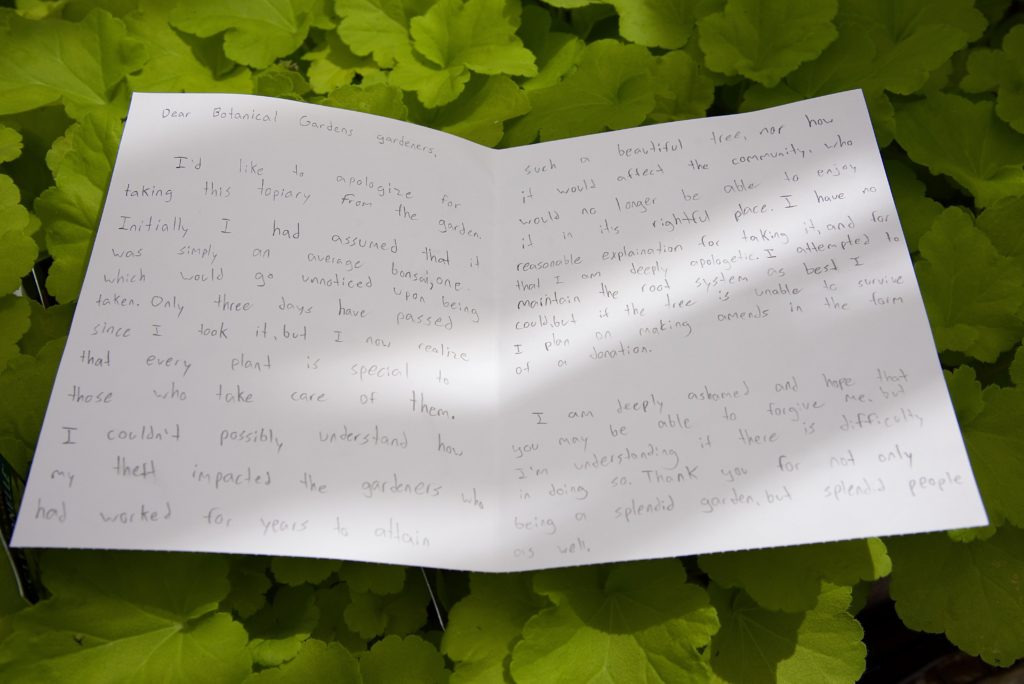 In the update about the plant’s return, staff included a photograph of the apology note that accompanied the returned tree, found in a pot beside the empty hole where it once was planted in the Asian Garden.
In the update about the plant’s return, staff included a photograph of the apology note that accompanied the returned tree, found in a pot beside the empty hole where it once was planted in the Asian Garden.
“Thanks to all of you for your help!” the social media posting read. “Yesterday we posted about the loss of one of our favorite plants here at the Gardens. Today that plant was returned! The incredible outpouring of support was unexpected and uplifting. We even had a nursery offer us a new topiary! It is impossible to express the depth of our gratitude.”
Staff included a note to the person who returned the tree. “Thank you. The topiary that you returned means more to us now because of your act of kindness. We hope that you will visit the Gardens again frequently. You are always welcome here.”
The Juniper tree is nestled into its original spot, and gardeners are watching it carefully to see if it will suffer from possible root damage, which can occur when any plant – particularly a large tree like this one – is uprooted.
“We’re glad our tree is back, and we think we have all learned a great deal,” Gillman said. “We hope that the person who took the plant has learned that any action – even if we think it is a small thing – can have a big impact, and often can have a ripple effect. For us, that ripple effect included some unexpectedly positive aspects. We are particularly touched to see how much the Botanical Gardens mean to people. We know this, of course, but it was certainly nice to feel the love.”
Words and Images: Lynn Roberson, College Communications Director (Top: Director Jeff Gillman with topiary; second image: apology note.)
Mathematical Finance Program Ranked in Top 20 in Nation
UNC Charlotte’s Master of Science in Mathematical Finance program again has been named among the top 20 programs in the nation, ranking No. 18 in the TFE Times’ 2017 Master of Financial Engineering Program Rankings.
This is an increase from the previous No. 20 ranking for the Mathematical Finance program, which currently enrolls more than 90 students. The TFE Times’ rankings are the most comprehensive rankings for graduate financial engineering, financial mathematics, quantitative finance, computational finance and mathematical finance programs in the United States. The rankings are calculated based on a series of factors, including average GRE scores, starting salaries, undergraduate GPA, acceptance rates, and the number of employed graduates.
Located in the second largest financial center in the U.S., UNC Charlotte’s Mathematical Finance program is a joint program of the Department of Mathematics and Statistics in the College of Liberal Arts & Sciences and the Departments of Finance and Economics in the Belk College of Business. Students take courses from all three departments in an integrated curriculum. Students may use electives to tailor the program to their specific interests.
Graduates of the M.S. in Mathematical Finance program with previous employment gained an average $25,201 in salary and have an average salary of $93,407. Ninety percent of domestic students were employed or in graduate school within six to nine months after graduation. Recent alumni work for companies such as Bank of America, the Federal Reserve Bank, J.P. Morgan, KPMG, TIAA and Wells Fargo Securities.
With NSF Fellowship, Student Researcher Explores Undersea World
Beneath the surface of the sea exists a vast world that UNC Charlotte student researcher Tyler Carrier seeks to explore through research at the intersection of evolutionary ecology, oceanography, and microbiology.
“The questions I am attempting to answer are deeply rooted in fundamental evolutionary and ecological processes, and are also vastly unexplored, which leaves a lot of room to expand our understanding of how and why microbes are essential for life,” says Carrier, who is pursuing his doctoral degree in biology. “From talking with various people in the field of larval biology as well as animal-microbial symbiosis, there is some excitement as to what we can find out.”
He is investigating how larvae endure starvation from a microbial perspective and how that response may change depending on the geographical location of the parental habitat. This investigation will begin to unravel whether microbes help animals cope with environmental stressors and provide a landscape for adaptation. Carrier believes the implications of this may apply more broadly to many other animals as well as plants.
Carrier’s work resulted in his selection for a National Science Foundation Graduate Research Fellowship. The NSF Graduate Research Fellowship Program recognizes and supports outstanding graduate students in NSF-supported science, technology, engineering, and mathematics disciplines who are pursuing research-based master’s and doctoral degrees.
He travels to field stations throughout the world to conduct experiments in the field, where his animals are found. Last summer, he conducted experiments at Friday Harbor Laboratories in Friday Harbor, Washington and at the Duke Marine Lab in Beaufort, North Carolina, and plans to conduct future experiments at the Sydney Institute of Marine Sciences, part of the University of Sydney, Australia.
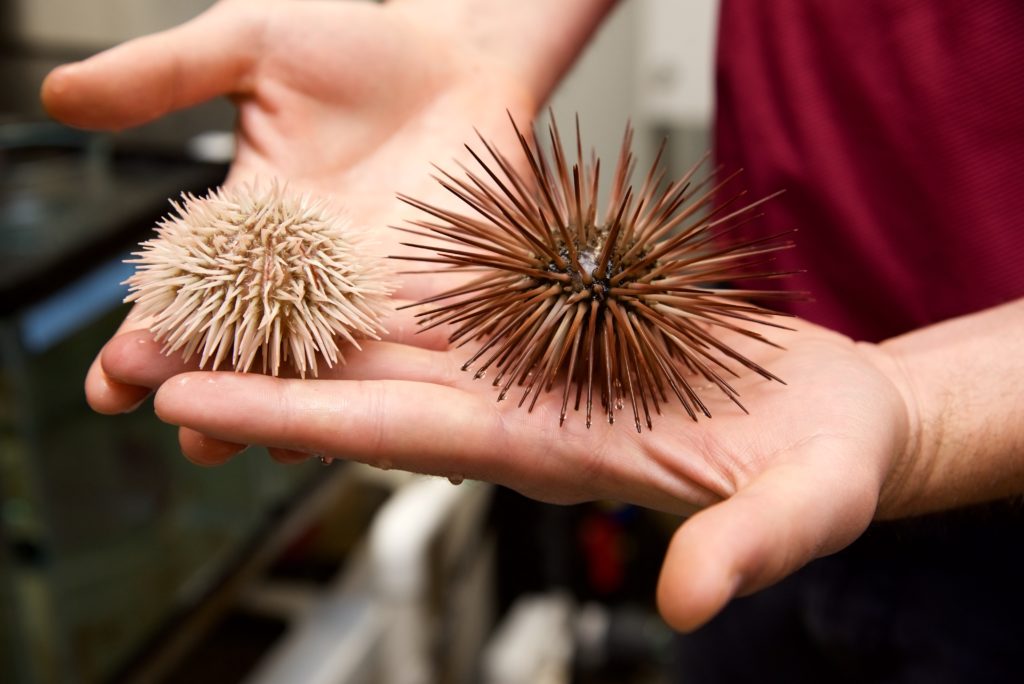 “Those who visit the world’s oceans find invertebrates at the seaside, and what they often don’t see is that those animals have water column-dwelling embryos and larvae,” Carrier says. “As a result of this tactic they use, larvae can be swept vast distances from the parental site. Many of these larvae have to find their own food in the form of single cell phytoplankton. At the surface, this doesn’t seem to be an issue, but where phytoplankton reside and their abundance varies greatly in the ocean with respect to both space and time. This could lead larvae to endure extensive periods of starvation.”
“Those who visit the world’s oceans find invertebrates at the seaside, and what they often don’t see is that those animals have water column-dwelling embryos and larvae,” Carrier says. “As a result of this tactic they use, larvae can be swept vast distances from the parental site. Many of these larvae have to find their own food in the form of single cell phytoplankton. At the surface, this doesn’t seem to be an issue, but where phytoplankton reside and their abundance varies greatly in the ocean with respect to both space and time. This could lead larvae to endure extensive periods of starvation.”
By conducting hands-on research by the sea, Carrier is able to study how larvae respond naturally to situations in the environment. “This is one of the first time that we are looking at the microbiome – or microbial communities – of marine invertebrate larvae, especially in their natural environment,” he says.
Carrier works closely at UNC Charlotte with his mentor Adam Reitzel, a biological sciences assistant professor, in The Reitzel Lab.
“The past few years have seen a dramatic increase in the appreciation for the roles bacteria play in animals, from development to longevity,” Reitzel says. “While much of the focus has been on mammals, for example humans, the complex and intricate functions of bacteria in the biology of marine invertebrates remains little studied.”
Carrier’s research is important in helping to address the paucity of knowledge in this area, Reitzel says, by considering how bacterial communities form and change their association with sea urchin larvae based on shifting environmental conditions.
“Tyler’s work has the possibility to tell the scientific community something quite novel and to help expand our appreciation for animal-bacteria interactions in the natural environment,” he says.
While a member of Reitzel’s research lab, Carrier has received highly competitive grants and published academic papers – including one in Symbiosis and another in Aquaculture International. His selection as one of 2,000 NSF Graduate Research Fellows chosen from 17,000 applicants has allowed Carrier to focus his energy on research and classes rather than worrying so much about financial burdens and other obligations that graduate students face.
“Upon hearing I was awarded the fellowship, I was in complete shock and disbelief because this is one of the most sought-after fellowships in the nation,” Carrier says. “There are also special Fellows-only programs that allow me to go to various laboratories around the world to conduct experiments and continue to enhance my training and network with the world’s best minds.”
Words: Brittany Algiere | Images: Lynn Roberson
Biologist Studies Sea Anemones’ Response to Changing Environment
A sea anemone, with its columnar, jelly-like body and bouquet of tentacles that protrude from its head like a Medusa curlicue mass, looks every bit a weird sea creature. For UNC Charlotte’s Adam Reitzel, this curiosity of a marine invertebrate also holds fascinating clues on how changes in the environment may influence molecular mechanisms such as circadian clocks.
The sea anemone, Nematostella vectensis, is in the phylum Cnidaria (“nye-dare-e-uh”) and is found along the Eastern seaboard from Maine down to Jamaica and Puerto RicoFlorida. Many of the anemones in Reitzel’s biological sciences lab come from the North Carolina coast.
Considered a model organism – as the sequencing of its genome has provided a map to gene evolution – sea anemones offer an ideal biological system for use in a wide range of comparative studies, including Reitzel’s investigation into circadian clocks.
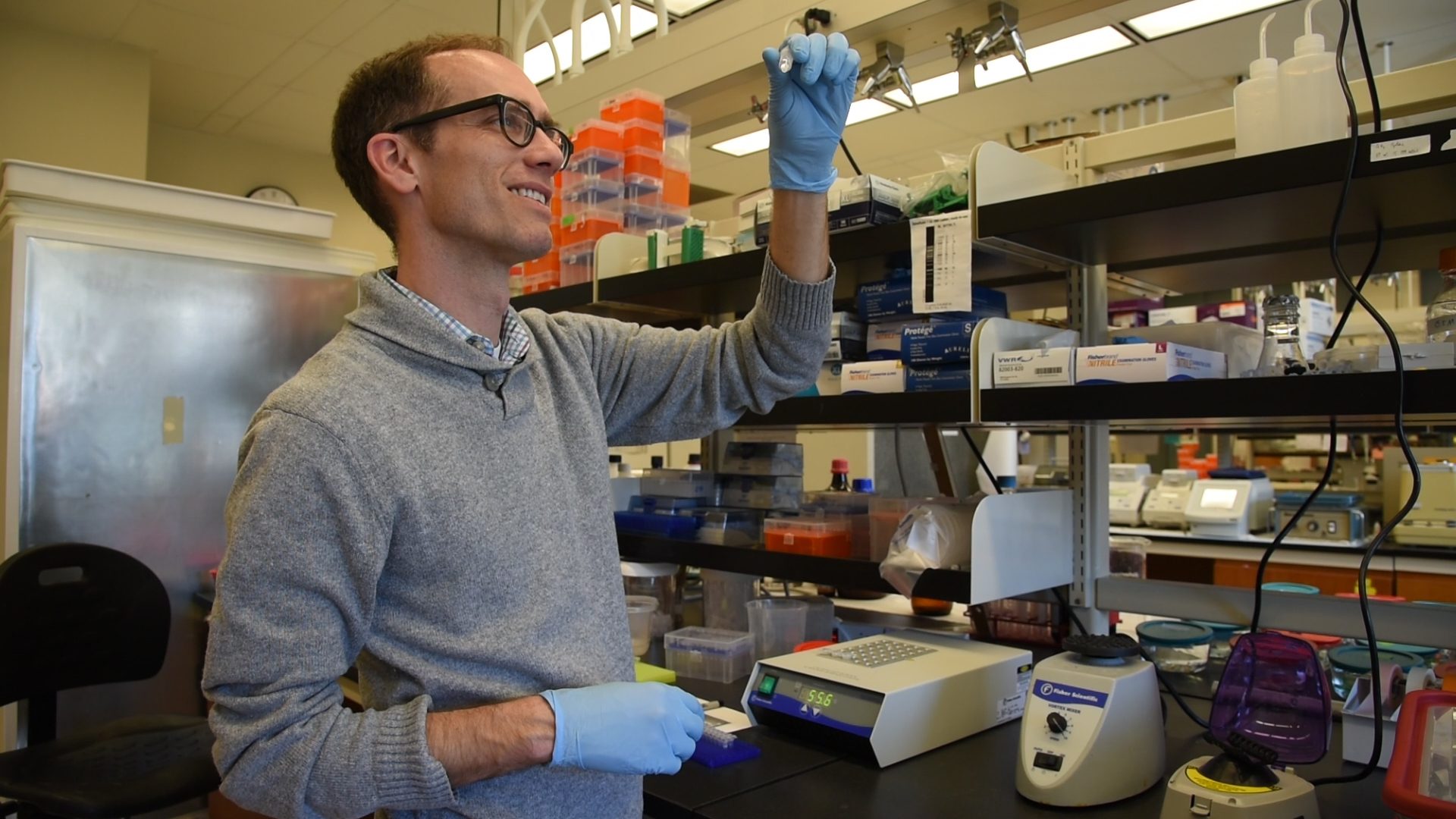 “The circadian clock is responsible for how we function,” Reitzel says. “Why do we wake up when we do? Why do we get hungry when we do, and why is this very predictable? The circadian clock is why we experience jet lag or tend not to be ourselves after we pull an all-nighter.”
“The circadian clock is responsible for how we function,” Reitzel says. “Why do we wake up when we do? Why do we get hungry when we do, and why is this very predictable? The circadian clock is why we experience jet lag or tend not to be ourselves after we pull an all-nighter.”
Evolutions of Stress Response
Reitzel’s lab uses sea anemones to learn more about how organisms may entrain their clocks when faced with disruptions. More broadly, his research considers the evolution and mechanisms of stress response and the genetic variation and adaptation of coastal invertebrates, including the purpose of the circadian clock.
“We are asking two fundamental questions,” he says. “One is from an evolutionary perspective. How does a sea anemone, in this case, have a circadian clock and how similar is it to the human clock? And two, how does that clock work? If we interrupt a sea anemone’s circadian clock, what does that do to that anemone? What does it do to its physiology?”
A key question is determining whether a sea anemone takes in environmental cues such as changes in light and, as a result, entrains its circadian clock to anticipate and adapt to environmental changes.
“There’s plenty of literature to suggest disruptions in the circadian clock can result in increased susceptibility to diseases,” he says. “We want to know, and this relates back to the non-human model, if we interrupt a sea anemone’s circadian clock, what does that do to that anemone?”
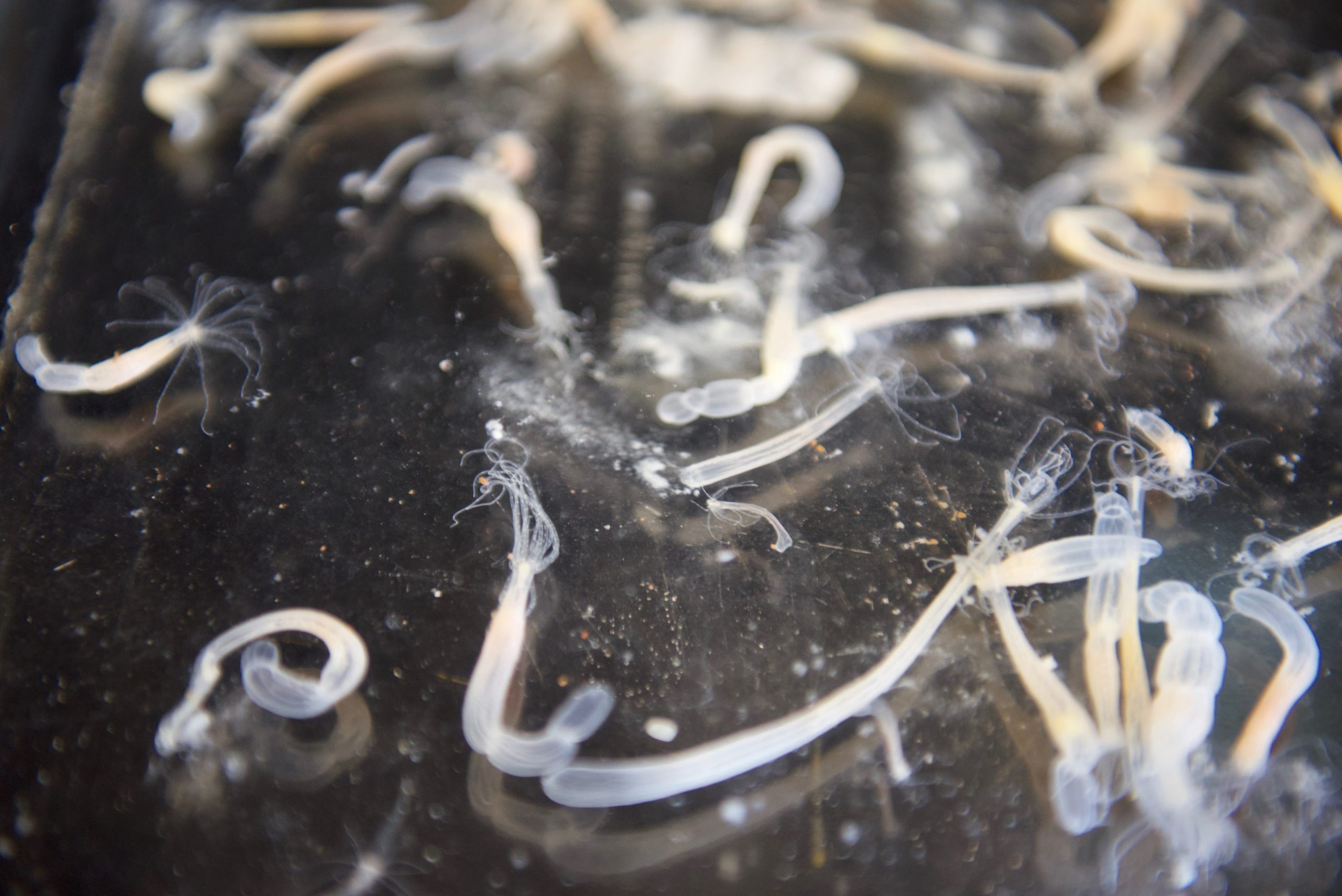 In a locked room near Reitzel’s lab, a video recorder captures the movement of sea anemones in a dish as they are exposed to light. A computer remotely controls the intensity of the light and whenit is turned off and on. Whitney Leach, a graduate student in Reitzel’s lab, uses light because it is the most predictable environmental cue.
In a locked room near Reitzel’s lab, a video recorder captures the movement of sea anemones in a dish as they are exposed to light. A computer remotely controls the intensity of the light and whenit is turned off and on. Whitney Leach, a graduate student in Reitzel’s lab, uses light because it is the most predictable environmental cue.
At the conclusion of the controlled manipulations of the environment, the lab team studies the tissue of the anenomes, specifically looking at the genes and proteins to assess what may have changed as a result of the environmental differences.
International Collaboration
Among Reitzel’s funding is the prestigious Young Investigators’ Grant from the Human Frontier Science Program, one of only seven awarded worldwide in the year he received the award. Reitzel and colleagues are looking at how bacteria and other microbes influence the biology of sea anemones, particularly in the context of climate change. Reitzel’s collaborators are Sylvain Forêt of the Australian National University and Sebastian Fraune of the Christian-Albrechts University of Kiel, Germany.
“We are looking at how organisms live naturally,” Reitzel says. “If they can respond and adapt by changing critical tagsgene expression or how they associate with particular types of bacteria or gene functions, it tells you how organisms are projected to survive in a changing environment.”
It has long been known that animals can adapt to their environment through changes to their DNA, or their genetic code. More recently, research has shown that non-genetic components may be important, as well — and in some cases essential — for processes such as health, aging and development.

For example, genetically identical twins, despite having identical DNA, are not copies of one another in appearance, behavior, or other characteristics that are dependent on their environmental experiences. Two central non-genetic contributors to individual variation are chemical modifications of the DNA, or epigenetics, and associations with different bacterial species or microbial symbioses.
Global Warming Research
“Evidence is growing that climate change has profound effects on marine ecosystems, yet our understanding and ability to predict how species respond in these ecosystems is still very limited,” Reitzel says. Unlike the genes of an animal, epigenetics and microbial composition can rapidly alter due to changes in the environment, making them ideal mechanisms to study how species respond to environmental threats like global warming.
The researchers are modeling their study on the anemone Nematostella vectensis, in which they are monitoring physiological, epigenetic, and microbial changes associated with thermal acclimation. They are separating the effects of each change through bacterial experimentation, and are carrying out gene knockdown and over-expression experiments to determine the function of critical host genes in epigenetic regulations and in the plasticity of the microbiota.
This research includes fieldwork in estuaries throughout the United States, including in North Carolina.
The aim of this research is to determine how epigenetic regulations and microbial communities participate in thermal acclimation of a coastal marine species residing in a dynamic temperature environment, and how these non-genetic factors interact with each other. The researchers hypothesize that changes in the microbial community improve the thermal tolerance of the host, and that the epigenetic landscape is responding both to the shifts in temperature and to the altered microbial composition.
“We believe these results will not only have important consequences for our understanding of the response of marine species to climate change, but will more broadly give us insight into unanswered questions regarding the role of epigenetic regulations and microbes in animal ecology and evolution,” Reitzel says.
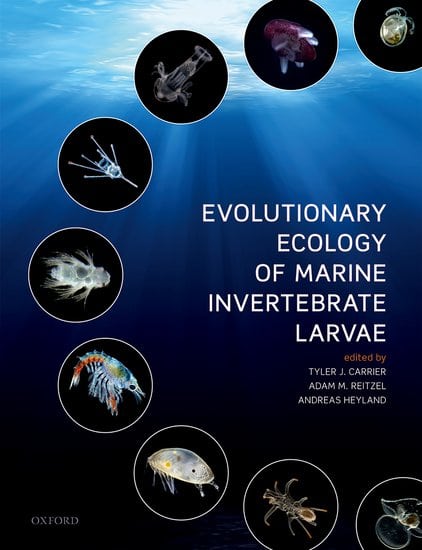 The research team also is exploring how epigenetics, microbiomes, and genomic mutations intersect, as they are largely studied in isolation at the moment.
The research team also is exploring how epigenetics, microbiomes, and genomic mutations intersect, as they are largely studied in isolation at the moment.
Reitzel joined UNC Charlotte in 2012 and received his doctoral degree in 2008 from Boston University. He has been on the review editorial board for Frontiers in Marine Molecular Biology and Ecology and has authored more than 70 peer-reviewed journal publications and book chapters, along with a recent book he co-edited with one of his graduate students, Tyler Carrier, along with Andreas Heyland of University of Guelph, Canada. The book is described as the first definitive book on the ecology of marine invertebrate larvae for more than 20 years and is noted for its establishing a fresh agenda for future research.
Scientific exploration first came into focus for Reitzel when he was a high school student in an advanced biology course and when he spent a summer as an undergraduate researcher on the West Coast with Brian Bingham of Western Washington University, as part of a Research Experience for Undergraduates program.
“I remember those times others took a chance on me and gave me the opportunity to conduct a research project, with mentoring, but allowing me to be very independent,” he says. “I got to come up with my own ideas and dedicate myself, and the work became mine as something I was really invested in. That had a huge impact on me to get into the field and to do this for a long time.”
Words: Leah Chester-Davis and Tyler Harris | Images: Lynn Roberson and Henry Gilmore. Top image: Reitzel and student Whitney Leach in the lab.
Graduate Students Win UNC Charlotte Three-Minute Thesis Contest
Squeezing years of work and thousands of words into a three-minute talk, graduate students Shayan Nazari and Danny Yonto earned first and second place in UNC Charlotte’s inaugural Three-Minute Thesis competition.
Nazari, who is pursuing her doctoral degree in Biological Sciences and won first place accolades, also earned the People’s Choice Award for her talk on “Breast Density: The Double-Edged Sword.” She earned $550 for the two awards and the opportunity to represent UNC Charlotte in the Conference of Southern Graduate Schools’ regional competition in Annapolis, Md. on March 2-5.
Yonto, who is pursuing his doctorate in the Geography and Urban Regional Analysis program, took second place and earned $300 for his 3-minute presentation on “What are the Characteristics of Contemporary Gentrification? A Case Study of Charlotte, NC.”
The 3MT® event is part of a worldwide initiative aimed at sharpening students’ academic, presentation and communication skills. Founded by The University of Queensland, it celebrates research conducted by PhD students, helping them learn to effectively explain their research in a language appropriate to a non-specialist audience.
Other College of Liberal Arts & Sciences participants in the 2017 competition were: Neha Mittal, Biological Sciences, with “Metabolomics and Genomics Integrative Approach for Genetic Dissection of Wild Soybean Complex Traits”; and Robert Bickmeier, Organizational Science, with “Differentiating Dirty Work.”
Nazari and Yonto shared their thoughts on the experience:
What motivated you to participate?
Nazari: I had previously heard about the 3MT® competitions that were being held in other universities and I thought it was a great opportunity for us, graduate students, to practice our communication skills with a diverse audience. I watched a lot of 3MT® videos and realized that the graduate students were genuinely excited to share information about their work. So naturally, I wanted to see it for myself. I think it is fun to do research in the laboratory and conduct experiments; I even love to troubleshoot when things go wrong. But one of my favorite parts about being a scientist is sharing my research with others in a way that everyone can relate to it and understand it. And that is exactly what I experienced with the 3MT® competition.
Yonto: For me, social science research impacts the most people when it answers the “so what” question. In order to get to that point, social scientists have to be able to communicate their ideas in a clear and concise way. Therefore, I used this competition to see if I can take all the work I have done and ask myself “so what”, what does my dissertation research really mean? Putting my research in that context allowed me to present gentrification in a dynamic and interesting way, which was quite a challenge for fewer than 3 minutes.
What did you learn from this experience?
Nazari: Through this experience, I learned how to effectively highlight the significance of my research and be able to communicate the main goal of my thesis in a very short amount of time. In graduate studies, we take a lot of classes and we conduct our own research and we become sort of experts in this one small area. I think learning how to communicate my work in a way that everyone can relate to and get excited about is a very valuable skill that I will take with me into the professional world.
Yonto: Communicating complex ideas in a clear and concise manner takes time and practice. Even though I can talk about gentrification for hours, the time limitation forced me to develop an outline that honed in on the most important points of my research. A struggle at first, viewing research through this lens allowed me to develop a narrative that best suited my audience.
How will you use what you learned?
Nazari: Sometimes 3 minutes’ time or less is all we have in an interview or while networking, to catch someone’s attention about our work. So I think learning and practicing to effectively communicate my PhD research to an audience from a wide variety of backgrounds and professions is a skill that is crucial to my future success as a scientist.
Yonto: In a few months I have a proposal and dissertation defense to present. Expanding on the 3MT® competition, I want to bring the same level of enthusiasm and determination that helped me focus on the most important points of my research. In doing so, I can clearly tell my audience what I have done, how I did it, and why it is important.
Image: Courtesy of Daniel Jones. Shown (l to r): Shayan Nazari, Graduate School Dean Tom Reynolds, Danny Yonto
Research Reality: Teachers Study With Researchers in CTI Initiative
Teachers lay the foundation for students to understand and embrace science. This significant role holds true whether the students aspire to scientific careers or simply need as citizens to understand how scientific research can help their everyday lives.
Despite their critical role, teachers often find themselves limited in their exposure to the settings where scientific research occurs.
This summer, Charlotte Teachers Institute worked with UNC Charlotte professors Susan Trammell and Marcus Jones to address that gap. Through a pilot program called the Summer Research Experience for Teachers, Charlotte-Mecklenburg Schools teachers collaborated with professors and graduate students in UNC Charlotte lab settings.
“I wanted to give teachers a first-hand look at what it is like to be a scientist,” says Trammell. “The teachers that I worked with come from many different grade levels and will prepare the scientists of the future. However, most of them have never been in a research lab and do not really know what it is like to ‘do science’ as a career. This is information that they need, to help inspire and guide their students.”
This summer’s initiative was a first for CTI, which is an educational partnership among Charlotte-Mecklenburg Schools, UNC Charlotte and Davidson College that works to improve teaching in Charlotte-Mecklenburg public schools.
“CTI is all about bringing together university and college professors to collaborate and co-create with classroom teachers,” says CTI Executive Director Scott Gartlan. “This program is no different. This experience for teachers cultivated their curiosity, creativity and knowledge of cutting-edge scientific techniques.”
The initiative came together because of converging interests, Gartlan says.
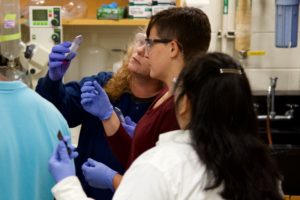 “Marcus Jones initially reached out to CTI to support his proposal for a NSF CAREER award,” he says. “Dr. Jones and I decided to include stipends for teachers to participate in a summer research experience in his university laboratory working alongside his graduate students.”
“Marcus Jones initially reached out to CTI to support his proposal for a NSF CAREER award,” he says. “Dr. Jones and I decided to include stipends for teachers to participate in a summer research experience in his university laboratory working alongside his graduate students.”
Meanwhile, Trammell, a three-time CTI seminar leader and CTI University Advisory Council member, also wanted to broaden her research agenda to include science teacher education, a passion of hers for years.
In each lab, Trammell and Jones provided guidance for the partnership. Graduate students educated teachers on laboratory protocols and scientific principles, as well as helping them develop curricula for later use in their classrooms. The teachers expressed surprise – and gratitude – for the important role that graduate students played in the labs and in their collaboration.
“As a graduate student, my duties included overseeing safety procedures and daily lab maintenance,” says Drew Tobias, a Nanoscale Science doctoral student in Jones’ lab who worked with the teachers, along with fellow student Kathleen Dipple.
“But my role ultimately became one of a mentor,” Tobias says. “We were able to keep the teachers engaged and productive, and they were excited to be here. I think they gained insight into actual experimentation and can better relate what we are doing to general life.”
Jones’ efforts with the teachers drew from his current CTI long-term seminar, called “It’s a Small World!” which draws upon themes from his NSF-funded research. “Nanomaterials could provide a pathway to cheap and abundant renewable electricity,” Jones says. “In that context, we discussed the need for sustainable energy and the economic and environmental factors that are driving the search for alternative sources.”
Coulwood Middle science teacher Joyce Patton describes the experience and its lingering impact as amazing.
“The summer experience in Dr. Jones’ lab was inquiry learning done right,” Patton says. “Engaging, inspiring and by far the best educational experience I have ever had. It was so inspiring I was able to work with a local scientific equipment company, CEM Corp., to donate a single-mode focused microwave unit. This will allow my students to safely synthesize nanoparticles, right in the classroom.”
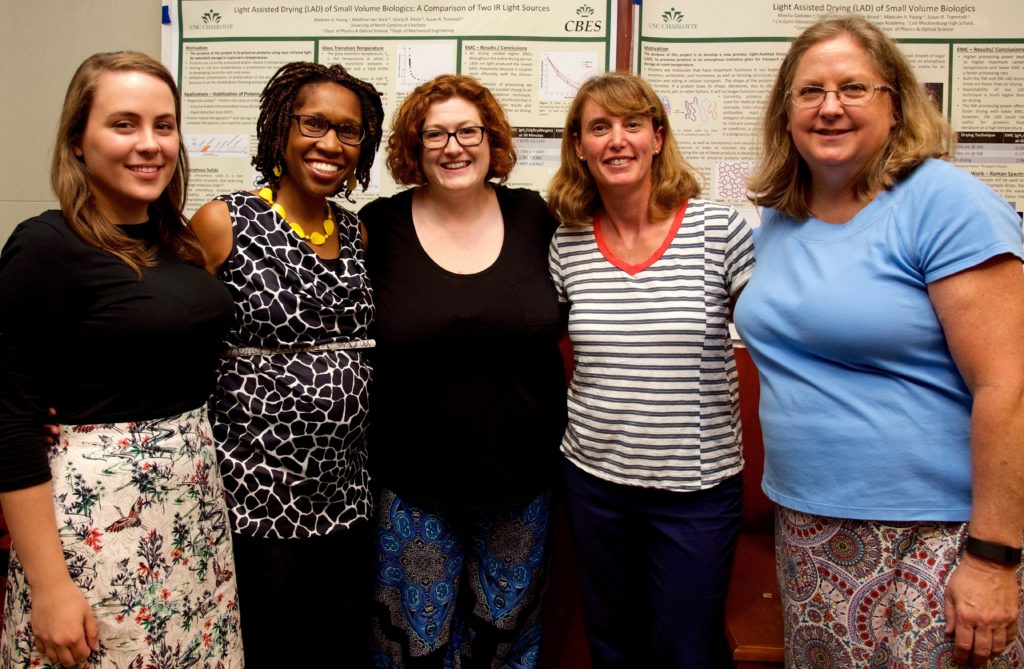 UNC Charlotte’s Trammell also turned to her CTI seminar, which is titled “How Science is Done,” providing a behind the scenes look at university research and the scientific method. Doctoral candidates Joseph Peller and Madison Young joined her in coaching teachers in the lab.
UNC Charlotte’s Trammell also turned to her CTI seminar, which is titled “How Science is Done,” providing a behind the scenes look at university research and the scientific method. Doctoral candidates Joseph Peller and Madison Young joined her in coaching teachers in the lab.
Trammell’s research concentrates on biomedical applications of optical techniques, imaging and spectroscopy in particular. Projects in her lab include building a new camera that can be used for cancer detection and developing a method to preserve proteins that are used in diagnostic tests.
“It was great experience for the teachers as they learned lab work is not as formulaic as standard teaching labs would apply,” Peller says. “They encountered problem after problem, yet continued to work rigorously until they resulted in success.”
Two undergraduate student who were conducting research through the Charlotte Community Scholars program joined the team, working with CTI as interns. Political science and economics student Anthony Ellis and psychology student Kenia Rios were part of a 9-week research experience that provides students with an immersive engaged scholarship experience to address community needs.
“Over the summer I worked directly with CTI to analyze six years’ worth of data to see if the program has caused any impact,” Ellis says. “I’ve gained tons of experience working with abstract quantitative data, and now have an idea on how we can use it to improve future programs.”
Since its inception in 2009, CTI has conducted 60 long-term seminars led by 46 Davidson College and UNC Charlotte professors for more than 400 CMS teachers, totaling over 17,000 hours of professional development. The summer experience provided another avenue for exposing teachers to intense professional development.
“The teachers developed a deeper understanding of university-level scientific research, methodology, and laboratory equipment and practices,” Gartlan says. “In turn, they will develop curricula that motivates and excites their students to see the essence of scientific inquiry more as a process of discovery than as a set of rules to follow.”
Words: Tyler Harris and Kendra Sharpe | Images: Lynn Roberson
Top Image: Doctoral student Andrew Tobias (left) with teachers Joanne Rowe and Joyce Patton; Second image: Teacher Joyce Patton with doctoral student Kathleen Dipple. Third image: Professor Susan Trammell (second from right), doctoral student Madison Young (left) and teachers Miesha Gadsden, Tabitha Miller, Connie Wood.